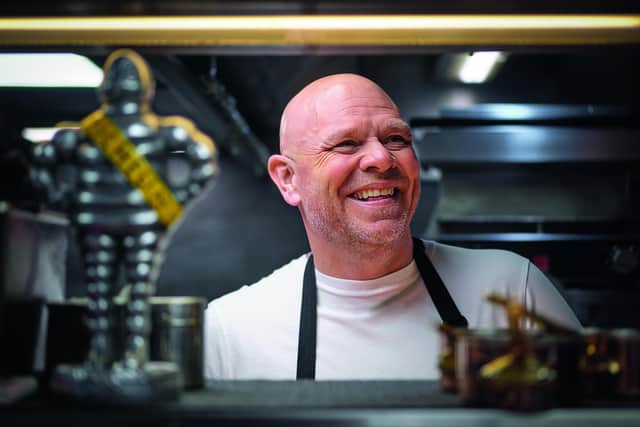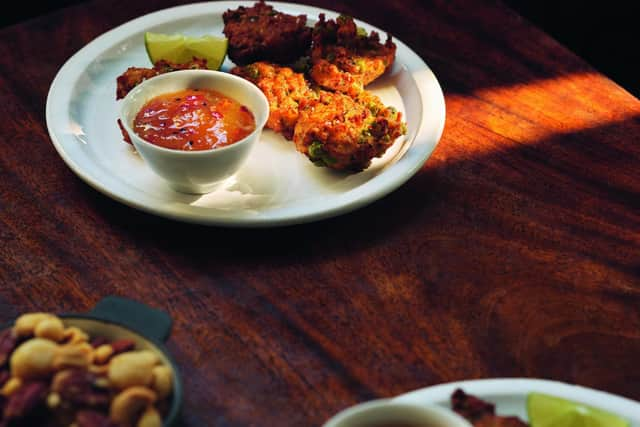Chef Tom Kerridge: How British food went from a ‘laughing stock’ to world class
“You haven’t necessarily got the same energy to be in a kitchen at the same point. Being a chef, you know when you’re in it and you’re in your early 20s, up to mid-20s and then into early 30s – those are your primetime. The level that we were cooking at or do cook at – you’re a Premier League footballer or rugby player, you’re in that zone at that level.
“As you get older, you recognise much more of it becomes about management and understanding a lot more of what’s happening on the other side, what’s happening with guests, people management, how do you control costs and all that. So you step into a coaching role… We’re much more like Gareth Southgate now, rather than Jack Grealish.”
Advertisement
Hide AdAdvertisement
Hide AdKerridge, who runs a string of restaurants, including The Hand and Flowers in Marlow, Buckinghamshire – the only pub in the UK with two Michelin stars – says that while his role might have changed over the years, his approach to food hasn’t. “Fundamentally, I’ve stayed exactly the same. The ethos, the energy – the food that we cook is always produce-based,” he explains. “It’s about taking something that people recognise and turning it into something world class, whether it’s a pie, whether it’s a steak, whether it’s just doing fish and chips, these sort of things. Understanding what it is that makes it, and how do you make it the best thing ever.”


Kerridge has put this ethos into his latest cookbook, Pub Kitchen: The Ultimate Modern British Food Bible, a follow-up to 2013’s Tom Kerridge’s Proper Pub Food. The first book included recipes such as steak tartare, bone marrow on toast and fish and chips – dishes Kerridge calls “beautiful British cookery”. Recipes in the new book are more of a departure, ranging from Cajun fish burgers to paneer and pea fritters and tempura sardines with seaweed mayo.
For Kerridge, it reflects just how much the pub landscape has changed over the past decade. “Over the last 10 years our pubs have become really exciting. We’ve become like an eclectic magpie, collectors of jewels of dishes from this rich cultural world we live in. Because we have such a diverse culture, we take these dishes and we so embraced food. We’re better than I think anywhere else in Europe at that.”
He suggests that while France, Spain and Italy have wonderful cuisines, they tend to stick to their national food. “You wouldn’t go to Italy and have a great curry – you wouldn’t necessarily associate [it with] that,” Kerridge adds. “But in this country, you can get fantastic Indian, Sri Lankan-style dishes, you can get beautiful food, that is also in pubs.
Advertisement
Hide AdAdvertisement
Hide Ad“There’s no other restaurant type or style would you be able to go somewhere and have a Peruvian-style cured fish dish like a ceviche as a starter or a Korean BBQ mackerel, followed by some kind of prawn tikka, or a Mexican burrito, and then a treacle pudding. Only in pubs, and everything cooked beautifully, everything served really nicely.”


Kerridge says pub menus are a “wonderful reflection of how good and how vibrant and how forward-thinking our food scene has become”. Pubs have certainly shifted since he was growing up in Gloucestershire. “As a young kid, I remember my dad taking us – really, really young – and going into a pub beer garden where they’d be a rusty climbing frame and a swing,” he says. “And having a glass bottle of pop with a straw in it and some pork scratchings in the back garden, and being left there for three hours whilst he went to the bar with his mates.”
Kerridge suggests these establishments have had to become more than just watering holes. “I remember as a kid, people talking about how our culture was always about drinking and getting drunk and having a party. We used to look to the continent and go, ‘Why aren’t we more like them?’ Where people will go out for dinner and have a glass of wine and whether it was a bowl of pasta and a bottle of red somewhere in Italy, or whether it was fantastic grilled meats and fish and a couple of cold beers in a Greek taverna.
“Those sorts of places where food and alcohol, that cultural meeting space happens. And our pubs have most definitely reached out into being that space. Even the cheaper, branded, bigger-named and managed pubs that we all know – those spaces still have a food offering… You spend much more of your time in the pub doing other things than just drinking.”
Advertisement
Hide AdAdvertisement
Hide AdAnd yet pubs are in danger – a cause close to Kerridge’s heart, and one he speaks passionately about. “The reality of it is very, very difficult. The hospitality industry and pubs in particular are under a huge amount of pressure,” he says. “People have come back in terms of wanting to go out, but they’re spending less [and] there’s more people working from home.”
Plus, he notes that “food inflation is massive, and that’s across the board”, while utility bills are going up too: “There are energy companies that are making absolutely grotesque, ginormous profits, whilst thousands of businesses are closing on a monthly basis.” But Kerridge says he’s “always an optimistic person”.
“In 10 years’ time, I think we’ll be in an even stronger position, we’ll be right at the forefront of world cuisine. When I first started cooking 32 years ago, British food was seen as the laughing stock. Now, we are one of the most eclectic and diverse and brilliant culturally food spaces in the world, where pubs have global recognition.”
Pub Kitchen by Tom Kerridge is published by Bloomsbury Absolute, priced £27.